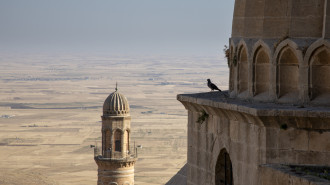Saudi, Iranian officials hold 'positive' direct talks in Baghdad: report
Senior Saudi and Iranian officials have been in direct talks to repair relations between the two regional foes, according to a Sunday report in the Financial Times.
Three unnamed officials briefed on the discussions spoke to the British newspaper.
The first round of talks, which mark the first political negotiations since the two countries cut off diplomatic ties in 2016, were held in Baghdad on April 9.
The talks covered cross-border attacks on Saudi cities and oil facilities by Iran-backed Houthi rebels and were described as "positive", according to one official.
The Saudi delegation was led by Khalid bin Ali al-Humaidan, Riyadh's intelligence chief, the official said, who added that another round of talks would begin next week.
Iraqi Prime Minister Mustafa Al-Kadhemi, who met with Saudi Arabia's Crown Prince Mohammed bin Salman, is reportedly spearheading the process.
The official suggested that in addition to the Houthi attacks, the talks were being expedited because of talks in Vienna on Iran's nuclear program in which the US is involved indirectly, aimed at reviving Tehran's 2015 deal with world powers.
Read also: Iran offers upbeat assessment of progress in nuclear talks
One unnamed Saudi official denied the talks took place. Neither the Iraqi nor the Iranian governments have commented on the matter.
However, a senior Iraqi official and foreign diplomat confirmed they had taken place. The Iraqi official said that Baghdad had also facilitated separate "communication channels" between Iran and Egypt and Iran and Jordan.
Baghdad's reported role will in the talks comes amid sustained efforts by Iraq's premier to forge closer ties with member states of the Gulf Cooperation Council (GCC), headquartered in Riyadh. At the same time, Iran maintains deep influence in Iraq through its network of powerful proxies and militia groups active in the country.
Twitter Post
|
Deep rivalry
As Washington's new administration pushes for an end to the grinding conflict in Yemen, widely seen as a proxy war Saudi Arabia and Iran, it confronts a long-standing rivalry between Riyadh and Tehran.
Iran was irked by Saudi Arabia's repressive policies towards its eastern-based Shia minority but its grievances turned to outrage when Riyadh executed influential Shia cleric Sheikh Nimr al-Nimr 2016. Iranians set fire to the Saudi embassy in Tehran in response, while both sides severed all ties.
Relations continued to sour in 2018, after former US President Donald Trump withdrew from Iran's 2015 nuclear deal with world powers and reimposed crippling sanctions. At the time, Saudi Arabia's crown prince, the kingdom's de facto ruler, hailed Trump’s policy of "maximum pressure" against Iran.
A year later, Houthi rebels launched a large-scale attack on Saudi Aramco facilities, temporarily slashing the kingdom’s oil output by a half. Both Washington and Riyadh blamed Tehran, though it denied involvement.
In 2020, when Trump ordered the assassination of elite Iranian commander Qassem Soleimani in a convoy outside Baghdad, Iraq was bought to the centre of regional tensions.
However, President Joe Biden has made some overtures to Iran, including his readiness to negotiate Washington's re-entry into the nuclear deal if Tehran stick to its obligations on curbing nuclear activity.
The reported Saudi-Iranian talks could be a sign that Biden's policy on Iran is ushering in a shift in regional dynamics. In January, Crown Prince Mohammed ended a three-year rift with Qatar, which Saudi had accused of being "too close" to Iran. The move was seen as an attempt by the prince to curry favour with the Biden administration.
Riyadh recently said it will not hinder the ongoing talks in Vienna, but wants Gulf powers to be involved in discussion on any new Iranian nuclear agreement. It wants to ensure any agreement addresses Tehran's missile programme and support for regional proxies.
Follow us on Facebook, Twitter and Instagram to stay connected







 Follow the Middle East's top stories in English at The New Arab on Google News
Follow the Middle East's top stories in English at The New Arab on Google News
![President Macron was at the game to show 'solidarity' [Getty]](/sites/default/files/styles/image_330x185/public/2024-11/GettyImages-2184064735.jpg?h=199d8c1f&itok=yXTymeCt)
![Israel demolished homes in the Silwan area [Getty]](/sites/default/files/styles/image_330x185/public/2024-11/GettyImages-2183868368.jpg?h=199d8c1f&itok=TweR8vd0)
